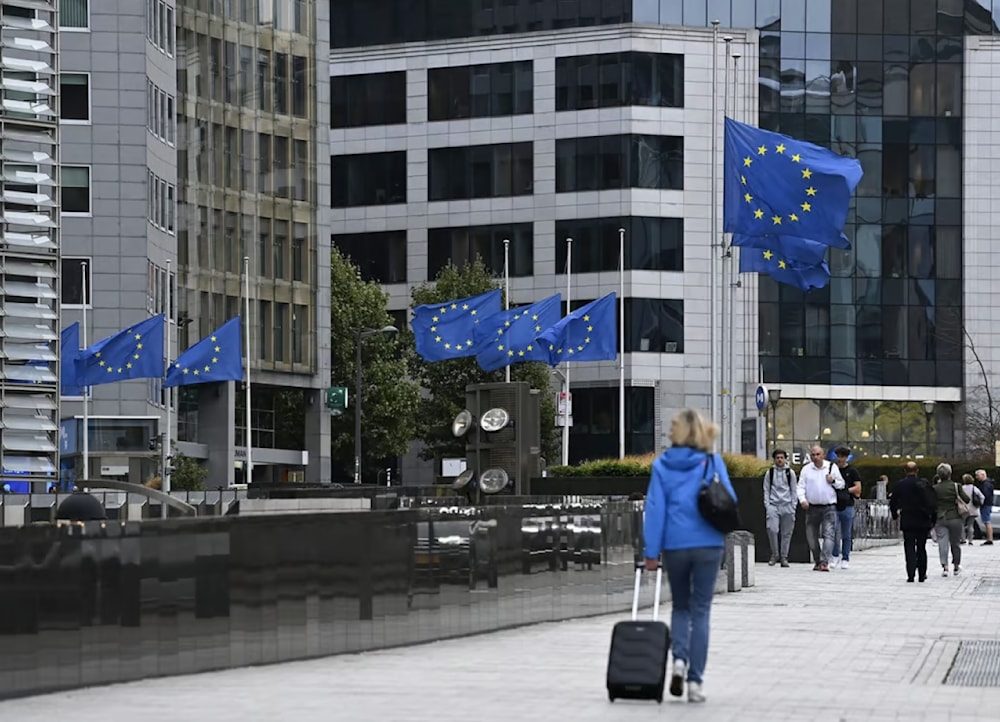Netanyahu faces potential 'consequences' from EU over Palestine
The aim of the EU's consequences will be aimed at pressuring Netanyahu to consider the establishment of a Palestinian state.
-

Pedestrians walk past as European Union flags flap, in front of European Union headquarters in Brussels, Thursday, Dec. 28, 2023. (AFP)
A Sunday report by the Financial Times unveiled a document circulated to member states ahead of a Monday meeting, pointing out that discussions during the meeting would involve foreign ministers considering potential consequences for "Israel", given Prime Minister Benjamin Netanyahu's reluctance to reconsider the decision regarding the establishment of Palestinian statehood.
According to the report, Brussels requested member states that they outline the "consequences" they anticipate linking to either participation or non-participation in the EU's Middle East peace plan, namely the consideration of the statehood of Palestine, or the "two-state solution".
Hence, the aim of drafting these consequences is to pressure Netanyahu to consider the establishment of a Palestinian state.
In response to inquiries about the nature of these potential repercussions, a senior EU official said they would involve impacts on preferential trade and investment benefits provided to "Israel" under their existing association pact with the EU.
Netanyahu has consistently rebuked the two-state solution, causing frustration among EU and US allies.
On Saturday, he reiterated via social media that "Israel" must maintain full security control over territories west of the Jordan River, effectively precluding Palestinian sovereignty in the Gaza Strip and the West Bank.
The EU is reportedly in the process of proposing a 10-point peace roadmap and aims to garner support from the United States and the Arab world. Portions of the initiative, as quoted by Euractiv on Saturday, detail a series of measures aimed at establishing Israeli and Palestinian states coexisting "side by side." The plan also highlights "robust security guarantees" for both nations and envisions a "full normalization" of ties between "Israel" and its Arab neighbors.
Read more: Israeli soldiers returning from Gaza feeling defeated, reports say
This comes against the backdrop of heightened tensions regarding the preconditions imposed by Saudi Arabia to reach a normalization agreement with "Israel."
The Gulf country has reiterated several times and through various diplomatic channels that the only obstacle standing in the way of normalizing relations with the Israeli regime would involve the establishment of a Palestinian state.
As a result of this, the US has been pressuring "Israel" to comply with Saudi preconditions.
Europe's global reputation damaged by stance on Gaza
A report by Politico on January 5 detailed that Europe's reputation from the Global South's perspective, which had already been damaged by its double standards regarding the War in Ukraine, had become even more brittle following the outbreak of the war on Gaza.
The initial complacency of the West during the War in Ukraine quickly dissipated as the global majority, including over 140 countries at the UN General Assembly, condemned Russia's actions in Ukraine.
The illusion of a united front crumbled as some major countries, notably China and India, refrained from criticizing Russia, revealing a more complex global landscape, the report states.
Despite Europe's attempts at repackaging and diplomatic adjustments, challenges persisted in dealing with countries that remained neutral in the conflict.
But the turning point came with Europe's divergent approaches to cease-fires in Ukraine and Gaza, exposing Western double standards and causing divisions.
The UN resolutions on Gaza highlighted the stark differences in Europe's stance, with Western countries initially voting against a humanitarian truce and later abstaining or voting against a stronger cease-fire resolution.
This divergence, along with internal disagreements among European nations, has marginalized Europe's role in the Middle East.
Read more: West's hegemony wanes as goals in Ukraine, Gaza out of reach

 4 Min Read
4 Min Read








